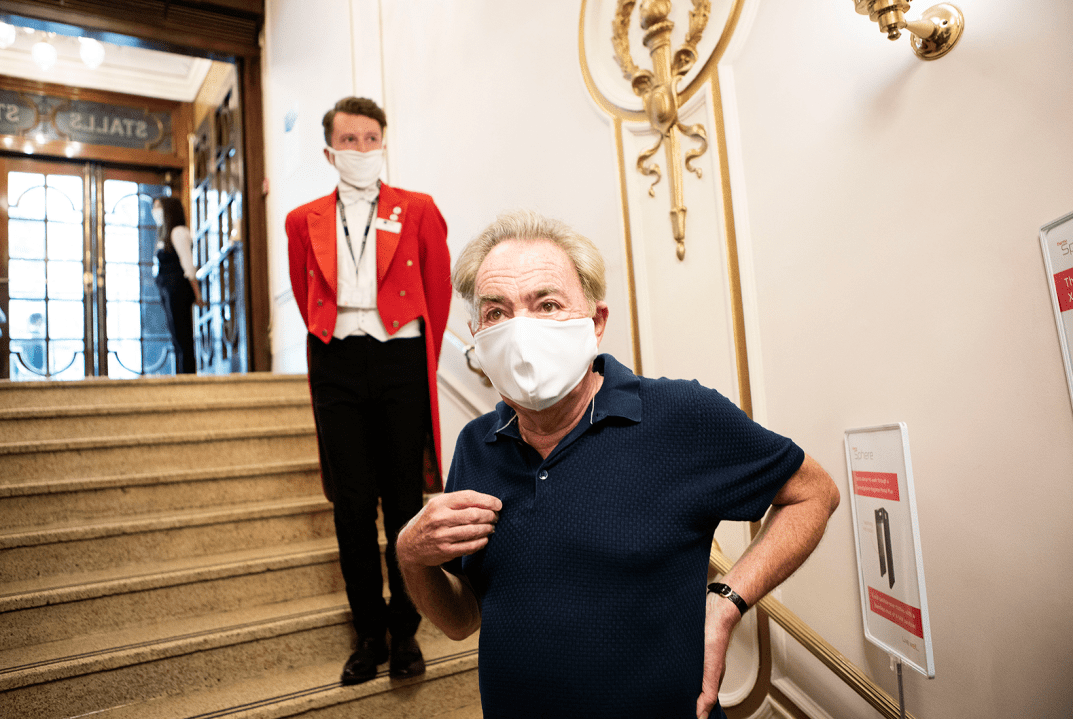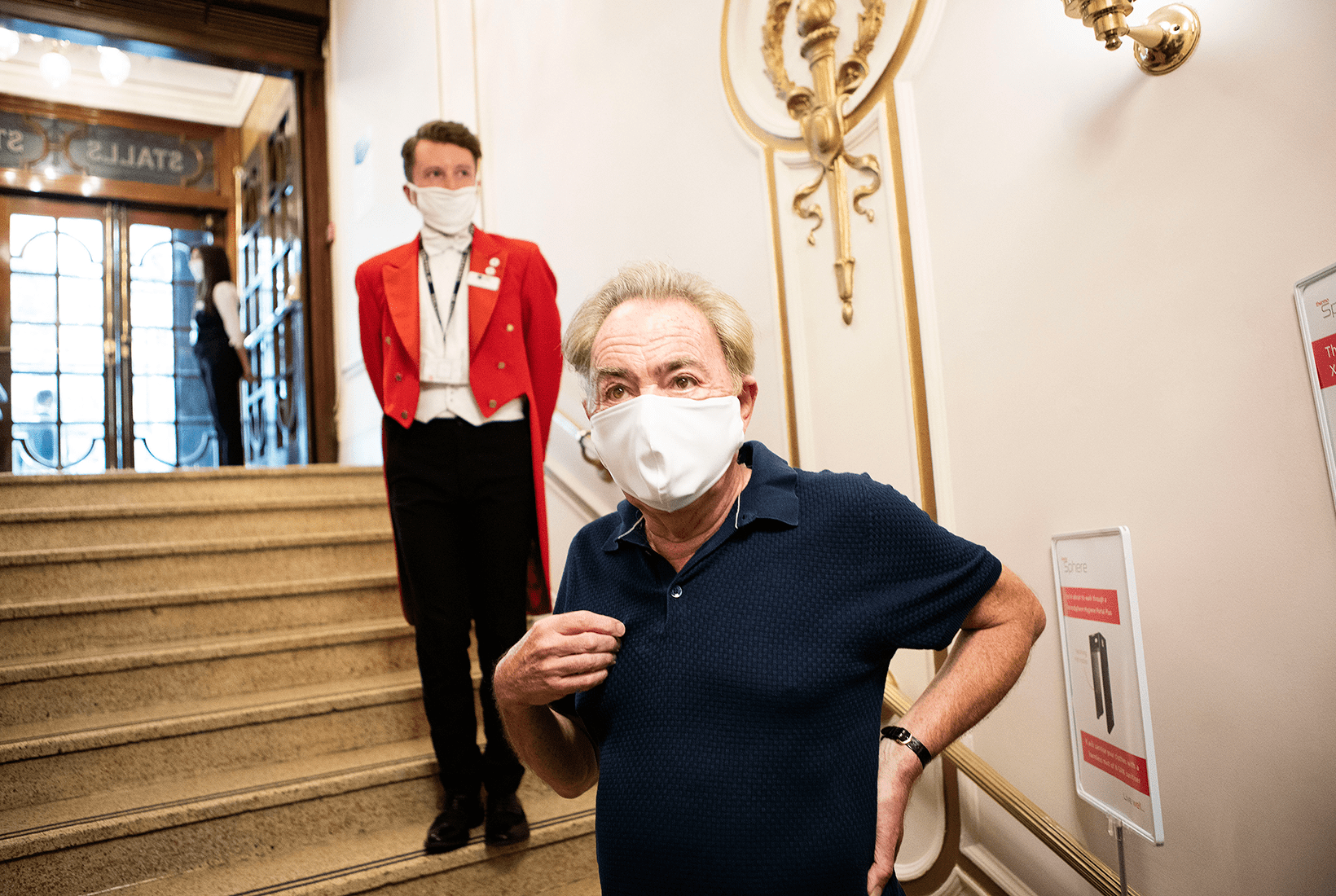‘Give us a date, mate!’ That was the sound of Andrew Lloyd Webber begging Boris Johnson to announce when the West End can return to normal.
He made his plea at the London Palladium on 23 July, where he was testing a new set of Covid-compliant measures during a one-hour solo show by Beverley Knight. It was the first indoor live performance in the capital since lockdown began. The impresario’s advance preparations had been exhaustively thorough. He arranged for the entire venue to be hosed down with an anti-viral fluid that kills the bug for up to four weeks. Every door handle had been fitted with a special cover that exterminates bacteria with silver ions. The audience were given staggered arrival times and they used a one-way system as they moved around the theatre.
The whole of Row A had been stripped out to ensure that the audience was at least five metres from the stage. And big gaps were visible between the meagre audience of 650 who showed up at the 2,200-capacity venue. Lloyd Webber’s exercise was hailed as a brave attempt to tiptoe towards a Covid-secure future as we enter ‘Stage Four’ of the government’s recovery programme: ‘Performances allowed indoors/outdoors but with limited distanced audience indoors.’
The seats were covered in clinical white fabric, and each vacant space was marked with a large black ‘X’
Theatreland is desperate for a swift move to ‘Stage Five’. ‘Performances allowed but with a fuller audience indoors.’ Until a date is announced, producers are powerless to start hiring the throngs of artists required to prepare and rehearse a West End show. Meanwhile, everyone is in limbo. The Ambassador Theatre Group is currently taking bookings for The Lion King in late October. Nimax, owner of six West End venues, is offering tickets to Everybody’s Talking About Jamie from 9 September — which seems a tad optimistic. Some London fringe venues are hoping to flip the ‘on’ switch in October or November. But all these dates are provisional. The panto season is looming and the UK’s largest producer, Qdos, has asked for firm guidance from the government no later than 3 August. Unless it receives proper assurances, Qdos may have to cancel 34 pantos around the country. These are vital to provincial theatres, which use the annual Christmas windfall to cover their costs for the rest of the year.
Many reporters assumed that Lloyd Webber wanted to show how the theatre might be made to work alongside the virus. In fact he was demonstrating the opposite. The West End cannot function under the present restrictions. The imagery from 23 July reveals his intentions. The Palladium has a sumptuous interior of gold and crimson but it looked quite different during the safety trial. The red seats had been covered in oblongs of clinical white fabric, and each vacant space was marked with a large black ‘X’. This eerie white sheeting and the massed ranks of crosses made the venue look horribly bleak and even more empty than it actually was. Great visuals, though. And a neat way to underscore his plea for action.
And as we enter Stage Four, what will a trip to the West End feel like? Hard work, is the simple answer. The website for Lloyd Webber’s own theatres features a video for future customers which shows masked cleaners wiping mahogany bannisters with virus-busting J cloths. The advice is to prepare for your visit before you leave home by taking your temperature and checking for symptoms. When you reach the venue, you’ll be required to don your mask and to submit to a ‘contactless bag-check’. To help the checkers you should winnow your belongings down to the barest essentials. As you enter the foyer you’ll be photographed by a thermal-imaging camera which detects your temperature and, presumably, goes beep if you’re over-heating. (Cinemas are already using these devices.)
Pre-ordered drinks and snacks can be collected from the bar and couriers will deliver further supplies to your seat. It sounds like a cross between a cruise ship and a prison camp. The levels of caution seem excessive and, frankly, baffling. The theatre has always prided itself on attracting rebels, outlaws, anarchists and free spirits. but the theatrical establishment is behaving like a crew of arch-conformists who don’t just accede to the authorities’ every wish but try to outdo them in paranoia and timidity. When did a government boffin ever order ‘contactless bag-checks’ to defeat the virus?
The spirit of fear and over-regulation is spreading. I’ve been invited to an outdoor press night with street marshals in attendance. ‘If you repeatedly fail to comply with their directions you may be asked to leave,’ I was crisply warned. The theatre won’t have much of a future if it keeps alienating customers with these scare tactics.
Besides, surely the government has opened up the professions in the wrong order? It’s hard to see why theatres were closed while aeroplanes were free to criss-cross the oceans. Air passengers are crammed together in a pressurised vessel where they have to inhale each others’ expelled breaths for hours on end. No sane person would argue that a sealed metal tube swirling with air particles and germs is safer than a well-ventilated theatre.
And what is to be done with the actors? Theatre, after all, is a contact sport. Look at professional football, however, and you will see that it restarted weeks ago, despite the inevitability of physical contact during matches. Each stadium now has a ‘sterile route’ leading into the dressing-rooms and players must produce a clinical passport before each game confirming that their latest test was negative. Theatres might have to follow some of these protocols. The difference is that actors perform not once but eight times a week. And it’s likely that daily tests will be demanded, especially by the older, portlier males who are at greater risk of contagion. Even in normal times, actors are fearful of any risk to their health. This bug happens to threaten those parts of the anatomy — the chest and throat — which are central to an actor’s earning power.
The alternatives for actors are masks or social distancing. And it hardly needs to be said that a one-metre buffer-zone between characters on stage will wipe out large parts of the repertoire. A skim through Shakespeare yields countless examples. Othello smothering Desdemona. The senators stabbing Caesar in the Capitol. Cordelia’s corpse being carried on stage by Lear. Laertes and Hamlet wrestling in Ophelia’s grave. Antony and Cleopatra’s last embrace. These classics would be unimaginable without such scenes. And some dramas will be simply unplayable. In Chekhov’s Uncle Vanya, the entire second half turns on a kiss between Astrov and Yelena.
There’s another key difference between football and showbusiness. Footballers don’t, on the whole, marry each other. But many actors have spouses who are also actors. So a positive test in one production could be passed to another by an infected thesp returning home and giving the bug to their partner. Covid-positive actors may be required to self-isolate at the theatre itself where they’ll be joined by colleagues who might also be carrying the bug. They’ll all end up sleeping on chairs and sofas in the crush-bar. It sounds like the start of a farce by Michael Frayn.








Comments